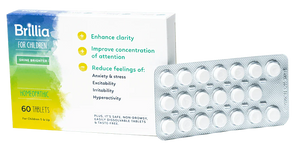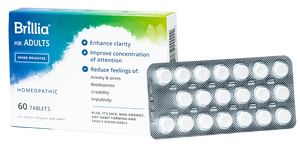Everyone gets angry, including children. If expressed in a healthy way and kept under control, anger is perfectly normal and can even push kids to advocate for themselves when they feel wronged. However, when it is held in for too long or when it leads to frequent outbursts, anger in kids can be detrimental to their emotional and physical well-being. Learn about the different types of anger below, long-term effects to be aware of, and how medication like Brillia can help.
Different Types of Anger in Children
Many adults have difficulty expressing their anger in a healthy way, so it should come as no surprise that children may also find this challenging. According to Denis Sukhodolsky, PhD, a clinical psychologist with Yale Medicine Child Study Center, anger issues often coincide with other mental health conditions, like ADHD, autism, obsessive-compulsive disorder, and Tourette’s syndrome.1 While genetics and other biological factors play a role, environment may also contribute, such as trauma, family dysfunction, and certain parenting styles. In the DSM-5 and potential diagnoses include:2
- Oppositional defiant disorder (ODD): Characterized by irritability, defiance, and argumentative behavior that lasts six months or longer
- Conduct disorder: Constantly violating the rights of others, including bullying and stealing, and showing patterns of defiance such as skipping school or running away from home
- Disruptive mood dysregulation disorder (DMDD): Having frequent angry outbursts and a pattern of irritability or depression
Long-Term Effects of Anger
Unchecked anger in children can result in poor academic performance, peer rejections, and mental health issues in adulthood.3 Studies show that long-term effects of chronic anger on one’s physical and emotional health include:4, 5
- Coronary heart diseases
- Diabetes
- Bulimia
- Substance abuse
- Reckless driving
- Brain fog
- Insomnia
- Obesity
- Migraines
- Anxiety
- Compromised immune system
How Brillia Works in Your System
Brillia is a non-prescription homeopathic medication designed to reduce anxiety, irritability, hyperactivity, and impulsivity and improve mood regulation while enhancing clarity and focus. The active ingredient of Brillia consists of antibodies to the brain-specific S100 protein (S100B), an important regulator of many different intracellular and extracellular brain processes.
People with symptoms of anxiety have elevated levels of the S100B protein that are in disarray. Brillia’s active ingredient binds to the S100B protein to regulate its activity, consequently helping to reduce these symptoms. This process quickly and effectively stops anxiety and related symptoms at the source without any harsh chemicals or harmful side effects. Even more, Brillia is safe and gentle enough to take with any other medications or supplements if your child is already taking medication.
Brillia relies on a holistic approach, which combines antibody science with behavioral science to maximize results. This is known as the 5 Pillars, and includes behavioral modifications such as following a nutritious diet, minimizing screen time, getting enough sleep, and practicing mindfulness to reduce anxiety, stress, and hyperactivity while reinstating a sense of balance in the child’s life.
Learn more about Brillia for Children.
Homeopathy & Other Anger Management Ideas
Children’s anger management doesn’t have to be complicated. While therapy and counseling can help your child get to the root of their anger and learn healthy coping mechanisms, homeopathic medication like Brillia can help promote a feeling of calm so your child can deal with their frustrations more rationally. This is especially true if you suspect your child’s anger is provoked or accompanied by another issue like an anxiety disorder or ADHD. Some other steps you can take to help reduce anger in kids include:
- Teaching your child how to verbalize their feelings: Studies show that putting feelings into words produces therapeutic effects in the brain6
- Helping them hone their problem-solving skills: When your child is having an outburst, they may feel completely out of control; by teaching them how to address and solve the problem triggering their anger, you help them calm down and feel more empowered at the same time
- Brainstorming healthy expressions of anger: Instead of denying your child’s angry feelings, teach them better ways of expressing themselves, ideally in a physical way, such as stomping their feet, scribbling in a special notebook, or even dancing out the fiery feelings
- Practicing mindfulness together: From deep breathing to nature walks, there are several activities you and your child can do together to promote mindfulness and relaxation as a family
- Choosing positive discipline over punishment: When your child is acting out, it’s tempting to lose your patience, yell, or inflict a punishment; a more effective choice is practicing positive discipline, such as teaching conflict resolution, modeling composure, and giving more attention to positive behavior than negative behavior
- Promoting cool-down corners over time-outs: Instead of sending your child to a time-out or naughty corner when they express their anger unhealthily, making them feel isolated and unsupported, teach them to reclaim their center by slowing down and engaging in a quiet activity while you remain nearby for support
- Dealing with your own anger: You can’t expect your child to express their anger in a healthy way if you don’t model it; be sure to catch yourself during moments of frustration and use these moments as opportunities to teach your child healthy coping mechanisms
Find more resources about dealing with stress, anxiety, anger, and other turbulent emotions at the Brillia blog.
 A whole bunch of support right in your inbox.
A whole bunch of support right in your inbox.







